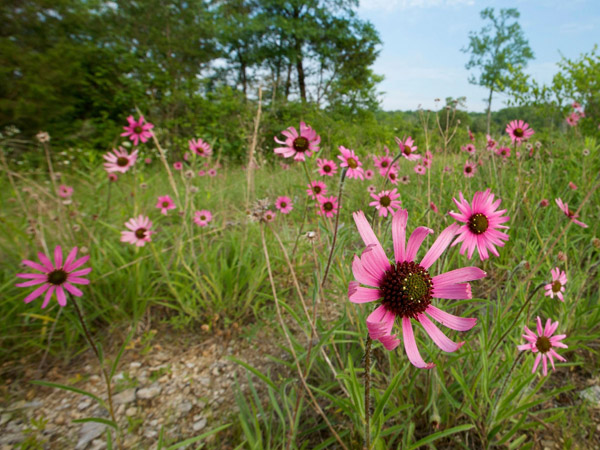Case Study
Conserving the Tennessee Coneflower
Protecting habitat for one of the country's rarest plants in the path of fast-paced residential development.

Objective: The Tennessee coneflower is rare and was imperiled by residential development in Nashville, TN. In the 1970's scientists confirmed its limited range and distribution. It is confined to a few square miles of the Nashville Basin. Because it is found nowhere else and the geography was extremely limited, the TN coneflower was among the first plants ever to receive federal recognition as an endangered species. The known populations of the showy plant were primarily situated on private property and in cedar glade environments.
Challenges: Nashville was growing and the TN coneflower needed protection. Landownership associated with colonies of TN coneflower was undocumented. Developers were in the cedar glades that the TN coneflower called home and were busily establishing purchase contracts on land. There was no public awareness in Nashville about the cedar glades, their unique native plant communities, the TN coneflower, or of threats to one of the State's most unique residents. Developers needed contact, landowners needed contact, and the community needed contact.
Solution: I recognized that the TN coneflower was the key to the conservation of some of central Tennessee's unique glade and barren environs. Plants and animals that call these thin-soiled limestone flats home are hardy, but will not withstand excavation, road building, utility placement, new homes, and grassed yards.
I sent a crew to the county courthouse to first map and research landownership for all the locations of TN coneflower colonies that botanists had identified. I then organized a strategic landowner contact program to get conservation out ahead of the developers. The contact program would continue over half a decade and deployed cooperative management agreements, private volunteer and paid stewardship arrangements, easements and leases, and eventual conservation purchases from willing sellers of all the extant TN coneflower colonies. I also approached developers and found receptivity to lighten impact in many of the key areas. The result was their selling some land to us while we worked to secure properties with less ecological value for them. We established a public awareness campaign in the glades and across the Nashville Basin. The campaign's hallmark was the placement of an image of the TN coneflower on the cover of the Bell South telephone directory, a hardcopy publication delivered to every household in the Basin.
Results:
■ All extant colonies of the Tennessee coneflower were identified and became a part of the long range strategic contact program resulting in the land protection of all priority colonies.
■ Robust colonies were acquired by The Nature Conservancy for eventual conveyance to public agencies for land term stewardship; Couchville Cedar Glade is exemplary Couchville Cedar Glade (tn.gov)
■ Nashville's community leaders embraced the conservation effort, including residential developers. Companies, including American Airlines and Bell South were extraordinarily generous in supporting the project and leading successful capital campaigns to acquire and conserve property.
■ The Tennessee coneflower was removed from the Federal Register of Endangered Species in 2011.
Results:
■ All extant colonies of the Tennessee coneflower were identified and became a part of the long range strategic contact program resulting in the land protection of all priority colonies.
■ Robust colonies were acquired by The Nature Conservancy for eventual conveyance to public agencies for land term stewardship; Couchville Cedar Glade is exemplary Couchville Cedar Glade (tn.gov)
■ Nashville's community leaders embraced the conservation effort, including residential developers. Companies, including American Airlines and Bell South were extraordinarily generous in supporting the project and leading successful capital campaigns to acquire and conserve property.
■ The Tennessee coneflower was removed from the Federal Register of Endangered Species in 2011.
